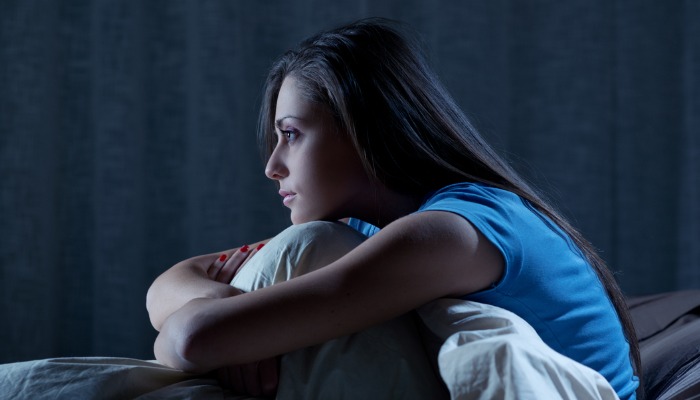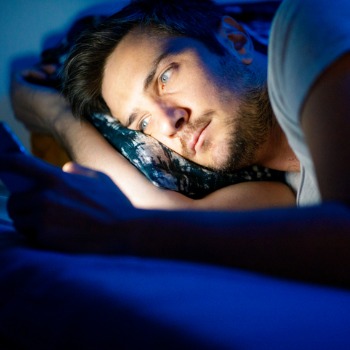Coronosomnia: the pandemic effect on sleep
In Common conditions
Follow this topic
Bookmark
Record learning outcomes

It’s a Catch-22 situation: while the effects of the pandemic have included stress and insomnia, stress and insomnia also appear to contribute to a higher risk of catching the virus. Not only that, but according to an international study of healthcare workers published in BMJ Nutrition Prevention & Health, stress and insomnia may also lead to more severe symptoms and a longer recovery period.
The study of 2,884 workers also revealed that each extra hour of sleep gained was associated with a 12 per cent lower chance of becoming infected with Covid-19. But how can better sleep be achieved in difficult times, and what can people do to improve the quality of their sleep when many are still operating under high levels of stress?
In a Puressentiel research survey, 83 per cent of respondents said they had experienced sleep issues during the pandemic. Three quarters said that during the most recent lockdown, a lack of sleep caused problems such as fatigue and mood swings. The most common trigger for sleep disruption was stress and anxiety, which was blamed by 57 per cent of respondents.
Mitesh Desai, CEO of Landy’s Chemist in London, has seen the effects of the pandemic on sleep first-hand. He explains: “With so many people working from home, there is very little disconnect between work life and personal life. The amalgamation of the two then eats into leisure time at home.”
Mitesh suggests that lockdown working life has been seeping into parts of people’s lives which were previously segmented, creating a knock-on effect on sleep. He adds: “It’s important to recognise that there are different parts of our life which deserve our full, undivided attention. Sleep is one of these, and by giving our sleep pattern more attention, we are likely to see significant improvements.”
83 per cent of respondents said they had experienced sleep issues during the pandemic
The effects of insomnia are something that community pharmacy is well placed to help with, and the British Society of Pharmacy Sleep Services (BSPSS) has been established to help pharmacy teams further their understanding of sleep disorders.
BSPSS president Gareth Evans believes community pharmacists are an under-utilised resource in this area. He hopes the society will promote the role of community pharmacy “as a trusted source of advice and information for patients with sleep problems, in order to create a patient-centric network of pharmacy-based sleep services.”
A community pharmacist himself, Mr Evans (who is also a member of P3pharmacy’s category panel) envisages that the BSPSS will become the first stop for pharmacy teams to access appropriate training, enabling them to triage patients seeking advice for sleep-related problems such as insomnia, snoring, sleep apnoea and even narcolepsy. The BSPSS website has resources for pharmacy staff, and there are plans to create a network of trained pharmacists who will liaise with local sleep services.
Sleep better: useful tips for customers
 Shut down electronics Keep laptops, phones and TVs out of the bedroom, or switched off at least an hour before bed. Electronic devices interfere with the body's internal clock and increase stress levels
Shut down electronics Keep laptops, phones and TVs out of the bedroom, or switched off at least an hour before bed. Electronic devices interfere with the body's internal clock and increase stress levels
Try not to dwell on worries in bed If the mind is full of distracting thoughts that are preventing sleep, it can help to write them down and decide to deal with them in the morning
Avoid exercise close to bedtime Although exercise is generally beneficial for sleep, it's best not done too close to bedtime as it raises core body temperature and heart rate. Encourage customers to leave at least a couple of hours between working out and bedtime
Stay connected Even if socialising in person is still restricted, keeping in touch is important for mental wellbeing and may help manage the stress and worry that contribute to insomnia
Welcome improvements
Sleep insufficiency – classified by some experts as less than seven hours of sleep a night – affects our ability to concentrate, increases mistakes and adversely affects mood.
As working from home has been a major part of the pandemic experience for lots of people, along with home schooling and general stress, it’s unsurprising that many have been reporting issues with quality and quantity of sleep. The Sleep Foundation has even coined its own term to describe the nation’s sleeping problems: coronosomnia. The foundation has created a guide to sleeping well during Covid-19, which can be accessed from its website.
Puressentiel’s research also confirmed that a lack of boundaries between work and home life is a major cause of sleep problems. Almost a third of the people it surveyed reported problems falling asleep while working from home – 27 per cent needed to catch up during the day to repay their sleep debt.
Some experts suggest that the recent increased prevalence of sleep disorders has pushed the issue to the forefront of medical establishment awareness and may lead to an improvement not only in understanding, but also in treatment.
The setting up of the BSPSS is one positive step, while treatments such as cognitive behavioural therapy for insomnia (CBT-I) are being used to support sufferers. A University of Michigan study from last year showed that patients who sought CBT-I online rated their treatment as being as effective as an in-person experience, opening the possibility of CBT-I being used to help more people in the future.
CBT-I combines several different approaches:
- Cognitive: changing inaccurate and/or unhelpful thoughts about sleep
- Behavioural: relaxation tips, advice on stimulus control and sleep restriction tips to rewire existing sleep habits
- Educational: information about the connection between thoughts, feelings, behaviours and sleep.
The Society of Behavioral Sleep Medicine offers a list of UK based practitioners, and a CBT-I app is available to download from the App Store and Google Play.
Physical relaxation techniques
Neil Shah, director of the Stress Management Society, suggests the following simple exercises to help customers and pharmacy teams cope with feelings of stress:
- With a deep breath in, raise the shoulders towards the ears and hold them raised for a few seconds. Then take a long, slow breath out and drop the shoulders down. Repeat this several times
- Place the fingers of both hands at the base of the skull; apply slow, circular pressure from the base of the skull to the base of the neck
- Close the eyes and relax the muscles of the face. Be aware of the eye muscles, jaw and forehead. Place the fingers of both hands on each side of the temples and slowly massage in a circular motion. Repeat several times
- Finish by cupping the hands over the eyes and holding for several seconds. This helps to release tension and tightness in the face.
A natural approach
Building a strong stress and sleep category starts with stocking a selection of sleep support brands. Pharmacy teams can assist customers by placing the stress and sleep categories together and ensuring there are multiple product formats that offer both proactive and reactive options.
Emma Wright, UK brand manager for Rescue, suggests that around two thirds of consumers prefer to try natural healthcare products first – because they believe natural ingredients work with the body, have fewer side effects and less impact on the internal clock. “Fear of dependency on medicinal products and possible side effects are the questions most often asked by consumers looking for relief from stress and sleeplessness, which is why alternative, ‘natural’ products are often sought after,” says Ms Wright.
“Pharmacists are in a great position to provide advice on realistic ways to manage stress, including educating consumers on the connection between the physical, emotional and cognitive impacts of stress and sleeplessness,” she adds.
A lack of boundaries between work and home life is a major cause of sleep problems
New research from Kalms suggests that during the pandemic, 87 per cent of people experienced symptoms of burnout, including stress, exhaustion, feeling unable to cope and low motivation. Many turned to holistic remedies rather than their GP – 34 per cent said they would opt for a herbal remedy over a prescribed medicine. Kalms has just launched Kalms Rhodiola, which contains Rhodiola rosea to help relieve symptoms of burnout.
Dr Tim Bond from Dragonfly CBD offers some interesting advice for people who use fitness and sleep trackers. He suggests that reliance on sleep trackers can be problematic. “With the rise in fitness trackers, tracking sleep patterns has also become the norm, but should we be basing how we feel on what a digital analysis of our sleep is telling us?” he asks. “Sleep is individual and there’s no specific sleep pattern that is ‘correct’, nor a specific amount of time asleep.”
Puressentiel’s Dr Chris Etheridge agrees, and further suggests that encouraging customers not to stress about sleep problems might help. “We are living through a strange period, and people may experience a slight alteration to sleep patterns,” he says. “The harder they try to sleep, the more it doesn’t happen. If someone has been lying in bed for a while and still hasn’t fallen asleep, the best advice is don’t force it. I would suggest getting up, getting some water and distraction techniques like reading, then trying again.”
Dr Etheridge also recommends natural sleep aids, including lavender-based products. Lavender is acknowledged as a soporific and relaxant by the European Medicines Agency and the World Health Organisation.
Views of the P3pharmacy category panel
“The pandemic has impacted the lives of many and this has resulted in a rise in stress and insomnia. We are mainly asked for advice on what people can do to help them sleep. For example, doing something relaxing before bed. For those unable to use lifestyle changes alone, Nytol is popular. Ideally, we want a minimal number of people suffering from insomnia and stress, especially as a lot of medicated treatments can potentially be abused. Perhaps look at alternative products to sell.”
Ellis Nugent, Well Pharmacy, Llantwit Major, South Wales
“After completing training with pharmacy.snorer.com, our eyes were opened to sleep disorders. We now offer obstructive sleep apnoea screening and home tests. Sleep disorders have a strong link to excess weight, so we have also seen increased uptake of our Lipotrim weight management programme. Active patient engagement makes a huge difference to sales and outcomes. Take advantage of the free training and support offered by the British Society of Pharmacy Sleep Services.”
Gareth Evans, Wansford Pharmacy, Peterborough
“This is a really important category and we frequently offer advice. A common question is what can I take to help me sleep? Nytol and Sominex do well. Nytol Herbal has become more popular. Customers also ask for supplements to help them to de-stress and address their sleep issues. We sell a specialist supplement called Hifas Da Terra, which is popular. It’s important to have a variety of natural and pharmaceutical products. Keep multivitamins in stock that can help, too.”
Sarina Mughal, Day Lewis, Knightsbridge
